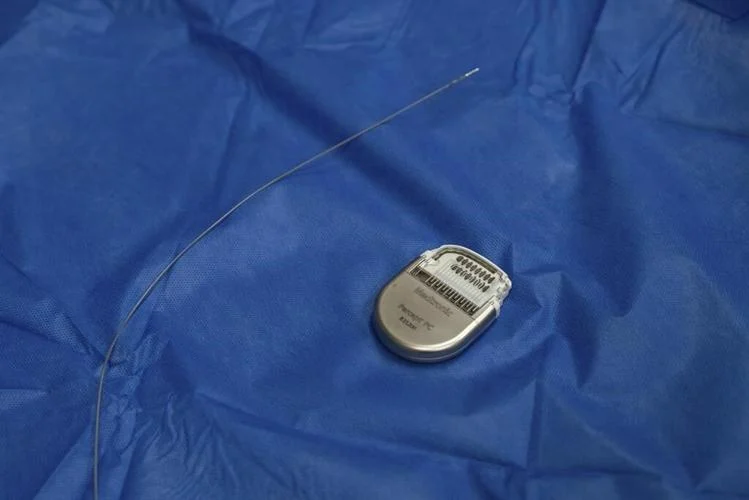
A sample pacemaker-like device used for brain stimulation therapy. (AP Photo/ Mary Colon)
Emily Hollenbeck faced a relentless battle with depression, a condition that felt like being trapped in a dark abyss, weighed down by an insurmountable gravity. With both her parents lost to suicide, she understood the fatal potential of her illness all too well.
In a bold move, Hollenbeck opted for a groundbreaking therapy: deep brain stimulation (DBS), which involved implanting electrodes into her brain as part of an experimental treatment. While initially daunting, DBS offered a glimmer of hope for individuals like Hollenbeck, grappling with treatment-resistant depression, a condition affecting nearly 3 million Americans.
DBS, akin to a pacemaker for the brain, delivers precise electrical impulses to targeted areas of the brain associated with mood regulation. Although traditionally used for conditions like Parkinson's disease and epilepsy, DBS has shown promise for depression treatment, despite setbacks encountered during research.
Despite initial skepticism, the Food and Drug Administration (FDA) expedited its review of Abbott Laboratories' DBS devices for treatment-resistant depression, signaling a potential breakthrough in mental health care.
Hollenbeck's journey with depression began in childhood, exacerbated by traumatic events and compounded by the loss of her parents. Despite seeking various treatments, including medication and electroconvulsive therapy, relief remained elusive until she discovered DBS.
The surgical procedure involved implanting electrodes into her brain's emotional regulation center, which connected to a device delivering controlled electrical stimulation. This stimulation helps disrupt the emotional circuitry characteristic of depression, allowing the brain to function more normally.
For Hollenbeck, the impact was profound. Following surgery, she experienced a noticeable uplift in mood, rediscovering joy in simple pleasures like music, which depression had rendered dull and lifeless.
Her journey with DBS highlights the treatment's potential to transform lives marred by depression. Yet, it's not without risks and challenges. Complications, including bleeding and infection, underscore the need for cautious consideration.
While skeptics question the treatment's efficacy and safety, ongoing research aims to refine DBS techniques and personalize treatment for individual patients. Hollenbeck's participation in clinical trials offers insights into the therapy's long-term effectiveness and its ability to track patients' progress objectively.
Her scars serve as reminders of her resilience and the strides she's made in her mental health journey. Today, Hollenbeck navigates life with renewed optimism, liberated from the suffocating grip of depression, thanks to DBS.
Her story underscores the transformative potential of innovative therapies in reshaping the landscape of mental health care, offering hope to countless individuals battling the shadows of depression.















